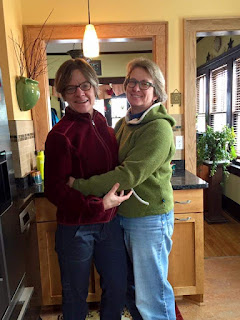Allowing People to Make Their Own End-of-Life Care Decisions
Steve and Stacy Stearns of Detroit Lakes, MN had recently celebrated their 21st wedding anniversary. They’ve been described as a loving, happy, and affectionate couple that spent most of their time together.
On September 27th the two were found dead in their home. Stacy was a victim of homicide and Steve’s death was ruled a suicide.
Steve was diagnosed earlier this year with terminal lung cancer. As his health deteriorated this fall the couple decided on a murder/suicide pact.
Minnesota is not one of the eight states that currently have “Death with Dignity” laws that create an environment for what is often called Assisted Suicide. Under these laws, terminally ill patients can make an informed decision to end their life medically when death is certain within the next six months. Usually, two physicians--not the patient’s own--confirm that death is imminent. Then the patient is reviewed by a mental health specialist for cognitive ability and understanding of the profound decision they will be making. Ultimately, the patient alone makes the final decision about whether and when to end their life.
In the last session of the Minnesota Legislature, on February 22, 2021, a bill was introduced to authorize medical aid in dying for terminally ill adults of sound mind. Titled the Minnesota End-of-Life Options Act, the bill is modeled after Oregon’s Death With Dignity Act which became law in 1997. The Minnesota law died in committee.
Carrie Framsted of Grand Marais hopes for a better outcome for the legislation in the next session.
Carrie is a volunteer co-leader with the Arrowhead Action Team for the group Compassion and Choices (C&C). According to its website, C&C, a nationwide organization founded in 1980, “works at all levels of government and healthcare nationwide to transform end-of-life care, with informed, empowered patients leading the way.”
Personal tragedy lead to Carrie’s volunteer efforts.
Carrie and Monica in happier times
In 2008 she met Monica Schliep, a middle school health teacher in the Twin Cities. They were together ever since, marrying eventually and planning a long life together.
Monica had deep family ties to Cook County and she built a home in 2003 on a local lake to be her retirement home. Over the years, the couple spent much of their free time at the lake, eventually selling their Minneapolis home to move here in 2019.
Monica was diagnosed with Stage 4 pancreatic cancer in June 2019. She was 55 years old. She died on February 15, 2020, just eight months after diagnosis.
Carrie said, “Monica had two main issues as she faced her diagnosis, management of pain and quality of life.” By the time she entered hospice care in 2020, doctors feared that her body was not going to be able to properly process pain medications.
After Monica died, Carrie found an article in the Minneapolis Star Tribune about Compassion and Choices, and end-of-life issues. She found a calling.
“I’m not sure if Monica would have chosen assisted suicide,” Carrie said. In any event, that was not an option in Minnesota.
As a co-leader for the Arrowhead Action Team Carrie’s mission is to educate legislators and the community about end-of-life options, specifically Death with Dignity.
Carrie said in her C&C profile, “I am now aware that family, friends, and our community need to understand what happens when one is dying. To have the language to discuss it, support to help along the way, and normalize options like palliative care and hospice to aid in a good death.”
Carrie says that opposition to the Minnesota End-of-Life Options Act came mostly from those who feel assisted dying is immoral and would put Minnesota on the so-called slippery slope. There is no evidence from the Oregon experience of almost three decades that such a slippery slope exists.
“Suicide is something people do on their own,” Carrie said. “It’s an impulsive decision.”
The medically assisted suicide that would be authorized in Minnesota has firm guidelines and guard rails to make sure that patients make an informed, not impulsive decision.
Now that Carrie is a retired member of the Cook County community she volunteers with Care Partners of Cook County and the Cook County Coalition of Lake Associations. She soon begins working at the local nursing home part-time as an Activities Assistant.
But her work with Compassion and Choices keeps her quite busy. She has become active in the local DFL organization and will be working to support and educate candidates for legislative seats representing the Arrowhead region.
Her philosophy follows the mission of Compassion and Choices which states, “We are working toward an America that respects everyone’s right to make their own end-of-life care decisions, in consultation with doctors and loved ones. We advocate for expanded options to ensure everyone can die peacefully and with dignity.

Comments
Post a Comment